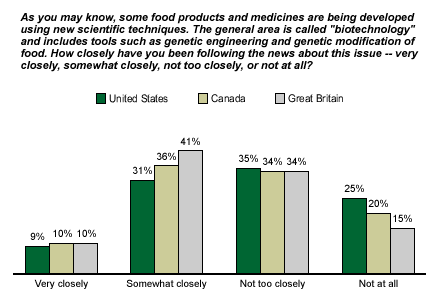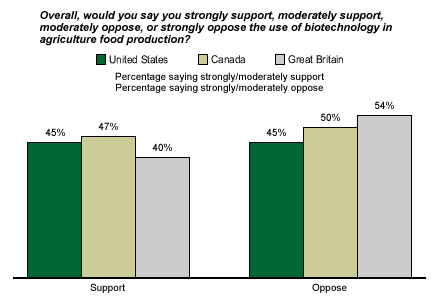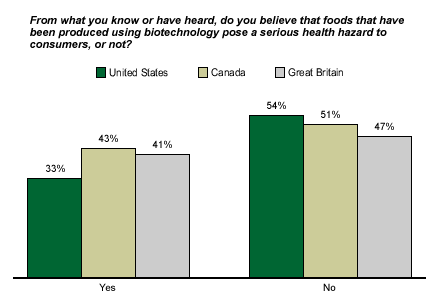The landscape along farm roads at harvest time today probably looks much as it did in the early 1990s. Then, as now, rows of corn and soybean soldiers stood dutifully at attention, waiting for farmers on combines to inspect their ranks. But on a cellular level, today's plants may be quite different. The first herbicide-resistant soybeans were released in the mid-1990s, and with that, the great debate about genetically modified (GM) foods began.
GM Awareness
Politicians, activists, and industry insiders may spar over the dangers or benefits of GM foods, but most people don't appear riveted to news about the issue. According to recent Gallup polling in the United States, Canada, and Great Britain*, 40% of Americans, 46% of Canadians, and 51% of Britons are paying at least somewhat close attention to the issue.

Pros and Cons
The initial objective for genetically modifying plants was to improve crop protection, and the GM crops that are on the market now are either more resistant to insects and viruses or more tolerant to herbicides than are other crops. But with these developments arose three main areas of concern (as reported by the World Health Organization): allergenicity (the tendency to provoke allergic reactions), gene transfer (the transfer of altered genes in GM foods to cells of the body or bacteria in the GI tract), and outcrossing (the movement of genes from GM plants into conventional crops and related species, or mixing of seeds from GM crops and conventional crops).
Sean Darragh, executive vice president of Biotechnology Industry Organization (BIO), sees a number of positive aspects about GM foods. "Biotechnology in agriculture contributes toward decreased environmental impacts of agriculture and improved production (quantity and quality) on existing lands, decreasing the pressure to convert remaining wild lands to agriculture to meet growing global needs," he says. "Products in the field now and headed for consumer's plates have higher levels of heart-healthy oils and health-promoting nutrients."
Deborah Koons Garcia, the director, writer, and producer of The Future of Food, a recent documentary about GM foods, is skeptical: "When people eat corn and soy products that are genetically engineered with DNA from viruses and bacteria, is that affecting their immune system so that they have more food allergies?" Garcia asks. "We don't know."
Bio Support
Where does the public stand? The polls show Britons are more likely to oppose (54%) biotechnology in food production and agriculture than favor it (40%). Canadians and Americans are about evenly divided in their support or opposition -- 47% of Canadians are in favor and 50% are opposed, while 45% of Americans are in favor with an equal percentage opposed.

In the United States, those who say they've followed this controversy very closely are fairly evenly spread among those whose strongly support (26%), moderately support (30%), and strongly oppose (33%) the use of biotechnology in food production. However, in Great Britain and Canada, those who say they have been following the issue very closely are particularly likely to say they strongly oppose the use of biotechnology in food production -- roughly half of Britons (51%) who follow the issue very closely say they are strongly opposed, as do 41% of Canadians most familiar with the issue.
Health Risks?
Much of the controversy surrounding GM foods pertains to the potential health risks associated with their consumption, but respondents in all three countries tend to believe bioengineered foods do not pose a serious health hazard to consumers. Perhaps not surprisingly, Americans appear to be much more optimistic than Britons about the safety of GM foods -- 54% of Americans do not think these foods pose a risk, compared with 47% of Britons. About half of Canadians (51%) share this sentiment.

Garcia joins the 33% of Americans who believe GM foods pose a health risk. "The scientists I've talked to say there are possible immune system problems, problems with organ growth rate, and problems with stomach lesions," she says. "But, without testing, we just don't know."
Darragh disagrees. "In the United States, biotech crops and foods are reviewed by up to three federal agencies before entering the marketplace: the U.S. Department of Agriculture, the Food and Drug Administration, and the Environmental Protection Agency," he says. "There is a widespread global scientific consensus that there are no risks uniquely associated with foods derived from crops improved through biotechnology."
Bottom Line
Darragh believes the world needs to move forward with this advanced technology. "People who care about the environment and sustainable agriculture, and who are concerned about feeding a growing world population, should support biotechnology," he says. "Agricultural biotechnology is viewed as an important tool in creating an eco-efficient world of the future -- a world where more food can be produced while at the same time reducing environmental footprint." For Garcia, the world needs to proceed with caution: "Once it's out there, you can't call it back."
*Results in Canada are based on telephone interviews with 1,005 national adults, aged 18 and older, conducted Aug. 22-31, 2005. For results based on the total sample of national adults, one can say with 95% confidence that the maximum margin of sampling error is ±3 percentage points. The survey was conducted by Gallup Canada.
Results in Great Britain are based on telephone interviews with 1,010 national adults, aged 18 and older, conducted Aug. 26-Sept. 8, 2005. For results based on the total sample of national adults, one can say with 95% confidence that the maximum margin of sampling error is ±3 percentage points. The survey was conducted by Gallup UK.
Results in the United States are based on telephone interviews with 1,006 national adults, aged 18 and older, conducted July 7-10, 2005. For results based on the total sample of national adults, one can say with 95% confidence that the maximum margin of sampling error is ±3 percentage points. The survey was conducted by Gallup USA.
